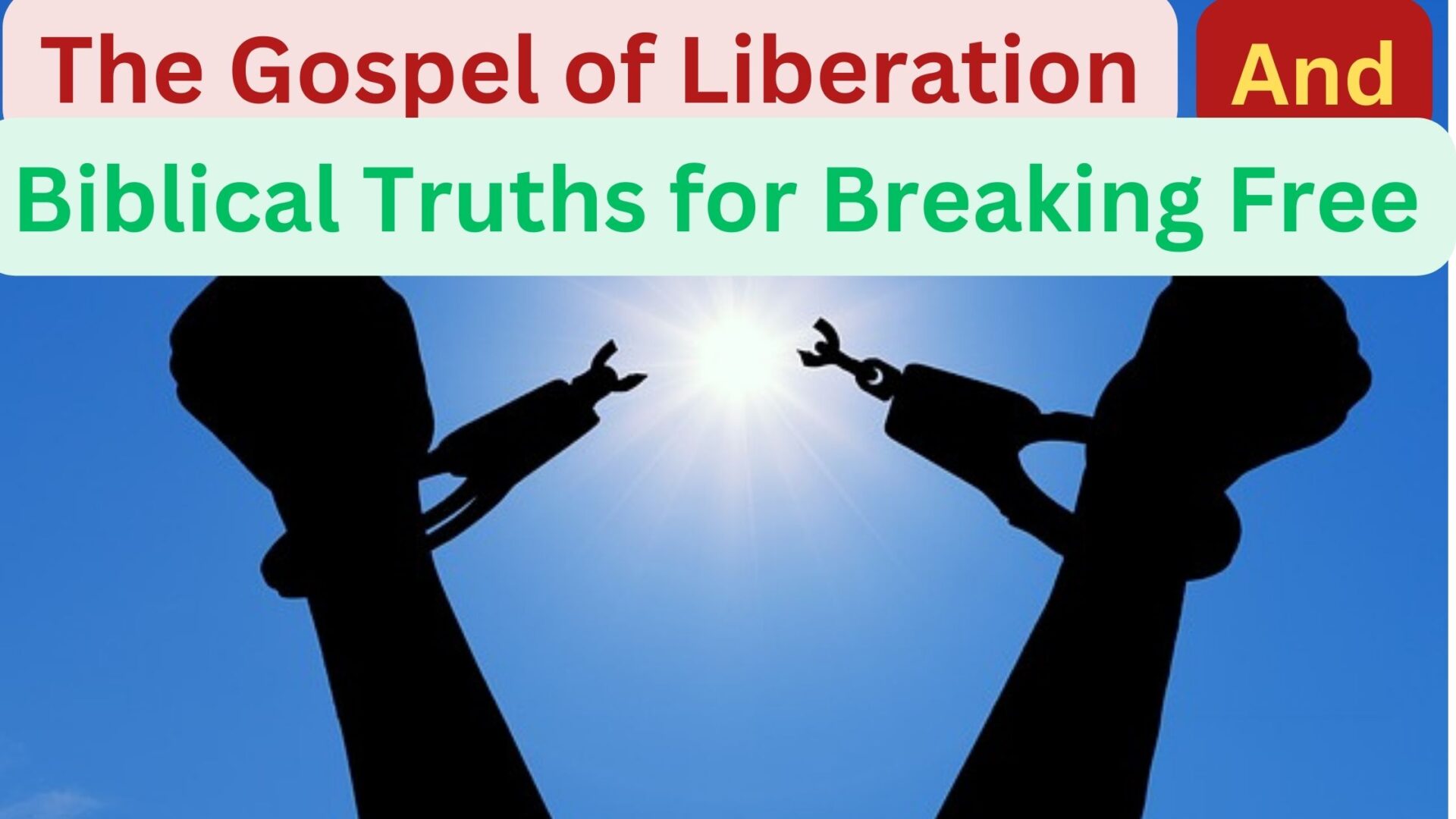Introduction:
“Unlocking Freedom: The Gospel of Liberation and Biblical Truths for Breaking Free”

In a world often bound by chains of oppression, the promise of liberation resonates deeply. The Gospel, with its profound message of freedom, offers solace and guidance to those seeking to break free from the shackles of bondage. In this article, we delve into the timeless wisdom of the Bible, uncovering its truths that pave the way for liberation and empowerment.
“What is the Gospel of Liberation and why is it trending?”
The Gospel of Liberation is a theological concept rooted in the belief that Christianity should advocate for social justice, liberation, and the empowerment of marginalized communities. It emphasizes the teachings of Jesus Christ as a call to address systemic oppression, poverty, and other forms of injustice. This approach to Christianity gained prominence in the mid-20th century, particularly in Latin America, through the works of theologians like Gustavo Gutiérrez and Leonardo Boff.
The Gospel of Liberation is trending due to its relevance in addressing contemporary social issues and its resonance with younger generations seeking a faith that actively engages with pressing societal challenges. As people increasingly seek spiritual frameworks that align with their values of equality and justice, discussions around the Gospel of Liberation have gained traction in both religious and secular circles.
“Why is the concept of liberation gaining traction in Christian communities?”
The concept of liberation is gaining traction in Christian communities for several reasons:
- Biblical Foundation: Many Christians interpret the teachings of Jesus Christ as inherently concerned with liberation, justice, and the upliftment of the oppressed. This interpretation is supported by numerous passages in the Bible that emphasize caring for the marginalized and advocating for justice.
- Social Relevance: In an era marked by growing awareness of social inequalities, discrimination, and systemic injustices, Christians are increasingly recognizing the importance of addressing these issues within their faith communities. The concept of liberation offers a framework for understanding and addressing these injustices from a spiritual perspective.
- Historical Context: The history of liberation theology movements, particularly in Latin America and other regions where communities have faced oppression, serves as inspiration for contemporary Christians seeking to engage more deeply with social issues. The successes and challenges of these movements provide valuable lessons for current efforts towards liberation within Christian communities.
- Youth Engagement: Younger generations, in particular, are drawn to faith traditions that prioritize social justice and activism. The concept of liberation resonates with many young Christians who are passionate about making a positive impact in the world and see their faith as a catalyst for social change.
- Global Connection: In an increasingly interconnected world, Christians have greater access to diverse theological perspectives and movements from around the globe. The concept of liberation, originating in Latin America but applicable to various contexts, has become a unifying theme for Christians seeking solidarity with marginalized communities worldwide.
Overall, the concept of liberation is gaining traction in Christian communities as believers seek to live out their faith in ways that actively promote justice, equality, and the well-being of all people.
“Can the Gospel bring about societal change and liberation?”
Yes, the Gospel can indeed bring about societal change and liberation. Throughout history, the teachings of Jesus Christ have inspired movements for justice, equality, and liberation in various societies. Here’s how:

- Transformation of Hearts and Minds: The Gospel teaches love, compassion, and empathy for others, challenging individuals to examine their attitudes and behaviors towards marginalized groups. As people internalize these teachings, they are motivated to advocate for societal change that promotes the dignity and well-being of all people.
- Empowerment of the Marginalized: Jesus’ ministry focused on uplifting the marginalized, including the poor, oppressed, and outcast. The Gospel empowers individuals and communities to resist oppression, assert their rights, and work towards liberation from unjust systems and structures.
- Community Building and Solidarity: The Gospel calls for the formation of inclusive communities that transcend barriers of class, race, and ethnicity. When Christians come together in solidarity, they can effect change by collectively addressing societal issues and advocating for policies that promote justice and equality.
- Inspiration for Social Movements: Throughout history, movements for social justice and liberation have drawn inspiration from the Gospel’s message of liberation and love. Leaders like Martin Luther King Jr., Desmond Tutu, and Dorothy Day were deeply influenced by Christian principles as they fought against racism, apartheid, and poverty.
- Spiritual Renewal and Revival: Societal change often begins with spiritual renewal and revival within communities. The Gospel’s message of repentance, forgiveness, and reconciliation can lead to transformative change at both individual and societal levels.
While the Gospel alone may not solve all societal problems, its teachings and principles can certainly serve as powerful catalysts for positive change and liberation when embraced and applied in the context of social activism, advocacy, and community engagement.
Conclusion:
In a world marked by bondage and oppression, the Gospel of Liberation shines as a beacon of hope and freedom. Through its timeless truths and transformative power, we are invited to break free from the chains that bind us and live lives of purpose, joy, and love. May we embrace the liberating message of the Gospel and share its transformative power with the world.
FAQ:
Q: What is the Gospel of Liberation?
A: The Gospel of Liberation is a biblical concept that emphasizes freedom from various forms of bondage, including sin, oppression, and social injustice. It is rooted in the teachings of Jesus Christ and highlights the transformative power of the Gospel to liberate individuals and communities.
Q: How does the Gospel address social justice issues?
A: The Gospel calls believers to advocate for the marginalized, care for the oppressed, and work towards a more just and equitable society. It emphasizes love, compassion, and justice for all people, regardless of race, gender, or socioeconomic status.
Q: Can the Gospel bring liberation to all aspects of life?
A: Yes, the Gospel offers liberation in all areas of life — spiritual, emotional, and social. Through faith in Christ and obedience to God’s Word, individuals can experience freedom from sin, fear, and despair, as well as empowerment to live lives of purpose and love.
References:
- The Holy Bible, New International Version (NIV)
- Cone, James H. “The Cross and the Lynching Tree.” Orbis Books, 2011.
- Soong-Chan Rah. “Prophetic Lament: A Call for Justice in Troubled Times.” InterVarsity Press, 2015.
- Martin Luther King Jr. “Stride Toward Freedom: The Montgomery Story.” Beacon Press, 2010.
- Brueggemann, Walter. “The Prophetic Imagination.” Fortress Press, 2001.
- Keller, Timothy. “Generous Justice: How God’s Grace Makes Us Just.” Penguin Books, 2012.
These resources provide valuable insights into the Gospel of Liberation, its biblical foundations, and its implications for contemporary social justice issues.








